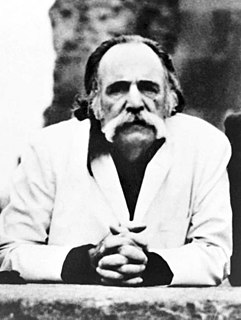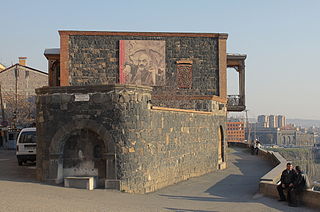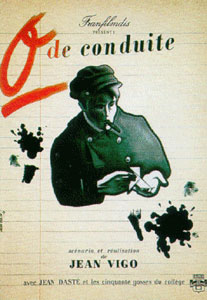
William Saroyan was an Armenian-American novelist, playwright, and short story writer. He was awarded the Pulitzer Prize for Drama in 1940, and in 1943 won the Academy Award for Best Story for the film adaptation of his novel The Human Comedy.

Jean Vigo was a French film director who helped establish poetic realism in film in the 1930s. His work influenced French New Wave cinema of the late 1950s and early 1960s.

The Gerasimov Institute of Cinematography, a.k.a. VGIK, is a film school in Moscow, Russia.

Artavazd Peleshyan is an Armenian director of essay films, a documentarian in the history of film art, a screenwriter, and a film theorist. He is renowned for developing a style of cinematographic perspective known as distance montage, combining perception of depth with oncoming entities, such as running packs of antelope or hordes of humans. Filmmaker Sergei Parajanov has referred to Peleshyan as "one of the few authentic geniuses in the world of cinema". Peleshyan was awarded the title of Merited Artist of the Armenian SSR in 1979, and Merited Artist of the Russian Federation in 1995.

The Color of Pomegranates is a 1969 Soviet art film written and directed by Sergei Parajanov. It is a poetic treatment of the life of the 18th-century Armenian singer Sayat-Nova. It has appeared in some scholarly polls of the greatest films ever made.

Otar Iosseliani is a Georgian-film maker. He was born in the Georgian capital city of Tbilisi, where he studied at the Tbilisi State Conservatoire and graduated in 1952 with a diploma in composition, conducting and piano.
Igor Andreyevich Savchenko or Ihor Andriyovych Savchenko was a screenwriter and film director, often cited as one of the great early Soviet filmmakers, alongside Sergei Eisenstein, Vsevolod Pudovkin and Aleksandr Dovzhenko. He is also known for teaching Sergei Parajanov at the Russian film school VGIK, also attended by Parajanov's best friend Mikhail Vartanov.
Merzak Allouache is an Algerian film director and screenwriter. He has directed 18 films since 1976. His 1976 film Omar Gatlato was entered into the 10th Moscow International Film Festival where it won the Silver Prize. His 1996 Salut cousin! was submitted to the 69th Academy Awards in the category of Best Foreign Language Film.
Parajanov: The Last Spring is a 1992 award-winning documentary by the Russian-Armenian filmmaker Mikhail Vartanov, that also includes the complete surviving footage of Sergei Parajanov's unfinished last film The Confession, Vartanov's behind-the-scenes sequences of Parajanov at work on the shooting of the Color of Pomegranates and other material. Featured in 7th Annual Russian Academy of Cinema Arts Awards (1993).

The Sergei Parajanov Museum is a tribute to Soviet Armenian director and artist Sergei Parajanov and is one of the most popular museums in Yerevan. It represents Parajanov's diverse artistic and literary heritage.

The 29th Cannes Film Festival was held from 13 to 28 May 1976. The Palme d'Or went to Taxi Driver by Martin Scorsese. In 1976, "L'Air du temps", a new section which was non-competitive and focused on contemporary subjects, was introduced. This section, along with sections "Les Yeux fertiles" of the previous year and "Le Passé composé" of the next year, were integrated into Un Certain Regard in 1978.
Mardik Martin is an American screenwriter of Armenian descent. He was born in Iran and raised in Iraq.

Arto Tchakmakchian is a Canadian-Armenian sculptor and painter, a member of the Royal Canadian Academy of Arts. He was awarded by the Armenian Order of Honor in 2015.

Zero for Conduct is a 1933 French featurette directed by Jean Vigo. It was first shown on 7 April 1933 and was subsequently banned in France until November 1945.

Love at First Fight is a 2014 French romantic comedy film directed by Thomas Cailley. It was screened as part of the Directors' Fortnight section of the 2014 Cannes Film Festival, where it won the FIPRESCI Prize in the Parallel Section. In January 2015, the film received nine nominations at the 40th César Awards, winning Best Actress, Most Promising Actor and Best First Feature Film.

Paulina is a 2015 internationally co-produced thriller film directed by Santiago Mitre. It was screened in the International Critics' Week section at the 2015 Cannes Film Festival where it won the Nespresso Grand Prize and the FIPRESCI Prize. It is inspired by the 1960 film La patota.
Martiros M. Vartanov is a graduate of UCLA and the founder of the Parajanov-Vartanov Institute in Hollywood, California.
DOC LA — Los Angeles Documentary Film Festival — is an international documentary film festival in Hollywood, California. It is organized by Parajanov-Vartanov Institute in Los Angeles. The festival aims to present films by American and International students, emerging auteurs and established masters, especially those that the city's other important film festivals overlook. While its primary focus is documentary and short films, DocLA selects and awards films of all genres, including fiction, animation and experimental works. The festival was noted for showcasing and awarding movies by women directors, and foreign language cinema, alongside independent American documentary films












